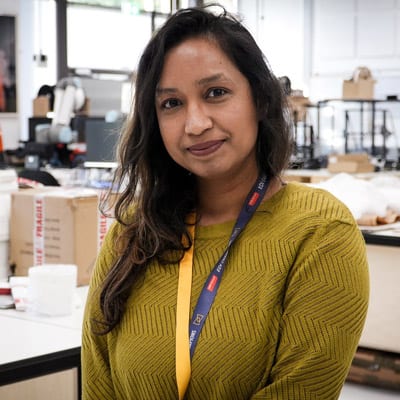UWE Bristol pioneers the development of wearable health-monitoring e-textiles

The reality of every-day use sustainable, washable and comfortable wearable electronic-textiles for personalised health monitoring has moved one step closer, thanks to innovative work by UWE Bristol academics at the university’s Centre for Print Research (CFPR).
“We’re taking significant steps forward in designing the textiles of the future. Imagine a COVID patient who’s isolating at home, wearing a simple printed t-shirt which is continuously collecting current body temperature, oxygen saturation and heartrate data,” said senior research fellow Dr Shaila Afroj at the CFPR.
“The technology within the t-shirt, which is unnoticeable to the wearer, sends the results to their smartphone, sounding an alarm if their vital signs fall outside a normal range, and then notifies their GP or a medical monitoring service.”
This is one of the possible applications that Dr Afroj and her research team at the CFPR is passionately working on. They, in collaboration with industrial partner KYMIRA, have successfully prepared a prototype of the wearable electronic textile – a simple piece of fabric which when placed around a wrist monitors a heart rate and can be worn and washed at least 10 times without compromising its monitoring ability.
As research continues with the team at the CFPR, it’s hoped the prototype will become a wearable garment, such as a t-shirt, which is unobtrusive to the patient, can be used in hospitals or at home to enable health data to be monitored remotely and continuously, and has the potential to minimise the number of NHS appointments and save around 60 per cent of cost per hospital patient.
To create the technology, Dr Afroj and the research team is utilising the advantages of the new promising material ‘graphene’ which shows incredible thermal and electrical conductivity, high elasticity, strength, lightweight and transparency.
As every atom in graphene is exposed to its environment, it can sense any small changes in its surroundings, which makes it an ideal material for sensors application.
They are also working tirelessly towards a goal to keep sustainably at the core of the research activities.
Instead of buying off the shelf graphene which can vary massively in terms of the properties, the team working in the Graphene Lab at the CFPR prepares their own graphene from scratch to be able to tune it to make it the best possible candidate for sensing application.
Additionally, they choose the challenging path to avoid commonly used solvents which are known to be toxic to humans and the environment, and even carcinogenic, and replace it with water – where the graphene is mostly unstable – to make the device the safest possible for the environment and the user.
This research also uses inkjet printing for digital fabrication of conductive tracks of graphene onto textile substrate. This sustainable way of fabrication produces 10 picolitres of tiny drops of material on demand, which makes it theoretically an option to print with zero material waste and minimum water usage.
This is a very challenging method considering the ink preparation required to perfect and achieve high resolution printing of continuous conductive track.
Dr Afroj has co-developed the very first all inkjet-printed graphene-based conductive patterns for wearable e-textile applications and has also co-developed highly conductive, scalable, and machine washable graphene-based e-textiles for multifunctional wearable electronic applications.
She plans to incorporate body temperature and oxygen saturation into the next prototypes, but the research is already breaking boundaries.
Dr Afroj added: “This is an exciting development in this area of research; it has brought invaluable knowledge as we continue to develop this technology.
"Such wearable e-textiles could be used for monitoring post-surgery patients, infants and babies, patients in triage at hospital, and for health-monitoring of the elderly.
"It could also enable early detection of asymptomatic and pre-symptomatic cases of COVID-19, potentially reducing the community transmission via remote monitoring of infectious diseases.”
Textiles are so ubiquitous, yet their functions have not changed much since the dawn of civilisation. Additionally, textiles have received widespread attention as a versatile platform in recent years for future wearable electronics applications. However, they are still far from the requirements of modern-day electronics.
The global textile industry is also often cited as the second most polluting industry after oil, responsible for around 8-10 per cent of global CO2 emission, 20 per cent of water pollution and approximately 35 per cent of microplastic pollution.
Therefore, radical new approaches are needed at both material and manufacturing level to transform textiles into highly innovative, sustainable, and intelligent clothing.
This month, the CFPR will be hosting the Future Textiles 2023 Conference, focusing on New Materials, Digital Manufacturing, and Sustainability, from 28 February to 2 March 2023, in Bristol.













